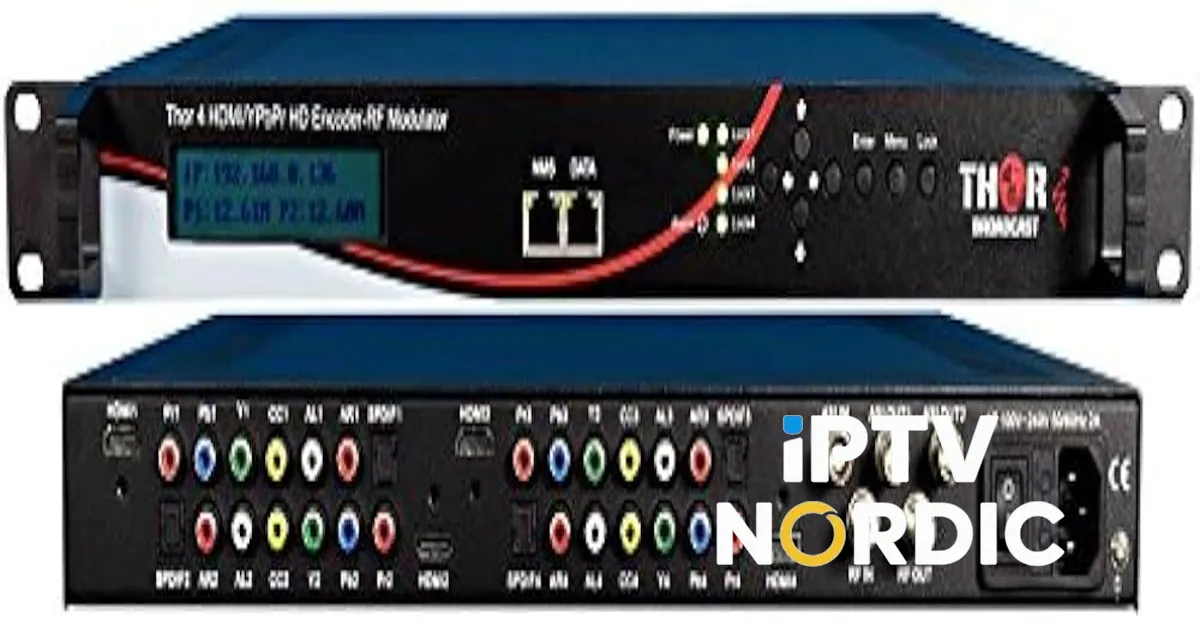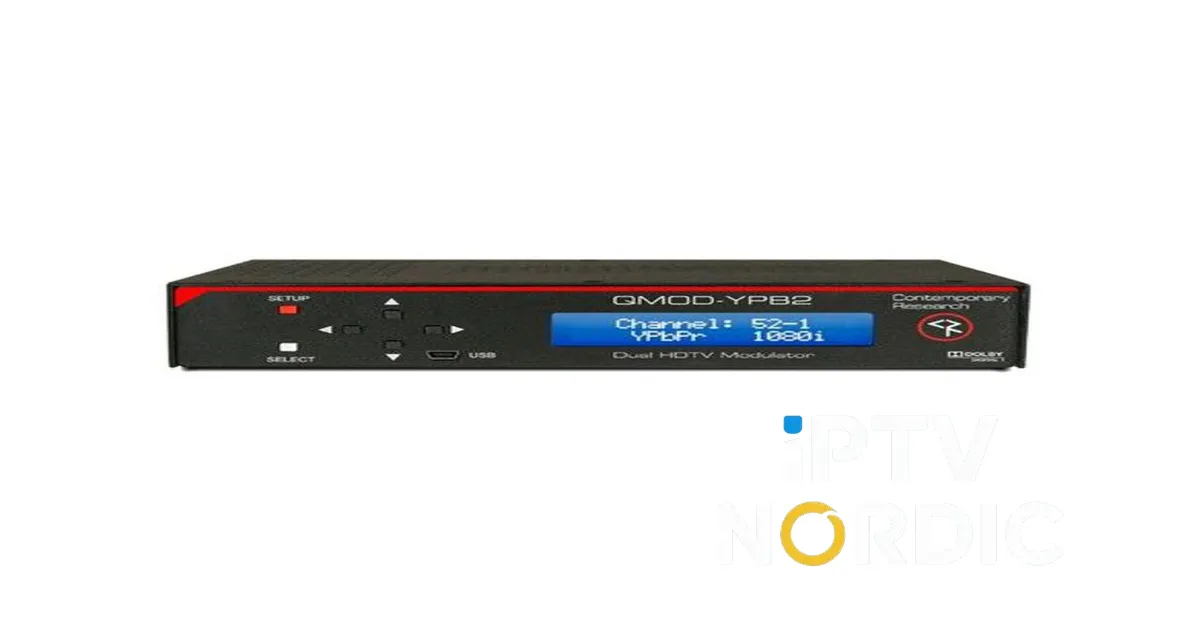IPTV, or Internet Protocol Television, has revolutionized the way we consume media content. One essential component of an IPTV system is the IPTV modulator. An IPTV modulator is a device that converts digital audio and video signals into a format that can be transmitted over an IP network. This conversion process allows broadcasters to deliver high-quality content to viewers through internet connections.
In the broadcasting industry, IPTV modulators play a crucial role in ensuring seamless transmission of live TV channels, video on demand, and interactive services. These devices enable broadcasters to efficiently distribute content to a wide audience while maintaining exceptional picture and sound quality.
In this article, we will delve into the world of IPTV modulators, exploring their functionalities, benefits, and impact on the broadcasting landscape. From understanding how IPTV modulators work to their significance in delivering next-generation television experiences, we will cover all you need to know about this essential component of IPTV systems. Let’s explore the fascinating realm of IPTV modulators together.
Understanding IPTV Modulators
IPTV modulators play a crucial role in the broadcasting industry by converting digital signals into formats suitable for transmission over Internet Protocol networks. These devices are essential for delivering high-quality video and audio content to viewers through IPTV platforms.
What is an IPTV Modulator?
An IPTV modulator is a device that takes digital video and audio signals and converts them into a format that can be distributed over IP networks. Essentially, it modulates the digital signals into a form that can be transmitted efficiently over IP-based networks. This conversion process ensures that the content is delivered seamlessly to viewers without any loss in quality.
Types of IPTV Modulators
There are several types of IPTV modulators available in the market, each with its own set of features and applications.
- HDMI to IPTV Modulators: These modulators are designed to convert HDMI signals into IPTV-compatible formats. They are commonly used in settings where HDMI sources need to be distributed over an IPTV network.
- RF Modulators: RF modulators are used to convert audio and video signals into a radio frequency signal that can be transmitted over coaxial cables. They are commonly used in cable TV systems and other RF-based distribution networks.
- Professional Modulators: Professional IPTV modulators are high-end devices designed for use in broadcasting and professional video production settings. They offer advanced features and functionalities to ensure high-quality signal transmission.
Each type of IPTV modulator has its own unique set of features and applications, making it important for broadcasters to choose the right type based on their specific needs and requirements.
Benefits of Using an IPTV Modulator
Using an IPTV modulator offers a range of benefits for broadcasters and content providers. Some of the key advantages include:
- Improved Signal Quality: IPTV modulators ensure that digital signals are converted and transmitted efficiently, resulting in high-quality video and audio playback for viewers.
- Efficient Distribution: By converting signals into IP-compatible formats, IPTV modulators make it easier to distribute content over IP networks, allowing for seamless delivery to a wide range of devices.
- Flexibility and Scalability: IPTV modulators offer flexibility and scalability, allowing broadcasters to easily expand their distribution networks and reach a larger audience without compromising on signal quality.
Overall, IPTV modulators play a crucial role in ensuring the smooth and efficient distribution of digital content over IP networks, making them essential tools for modern broadcasting operations.
Choosing the Right IPTV Modulator

In the world of broadcasting, choosing the right IPTV modulator is crucial for ensuring a seamless transmission of content to viewers. An IPTV modulator is a device that converts digital video and audio signals into IP packets for distribution over an IP network. When selecting an IPTV modulator, there are several factors to consider to ensure that the system meets your broadcasting needs effectively.
Factors to Consider
Compatibility
One of the most important factors to consider when choosing an IPTV modulator is compatibility. Ensure that the modulator is compatible with your existing infrastructure, including cameras, encoders, and network equipment. Compatibility issues can lead to signal loss or distortion, impacting the overall viewing experience for your audience.
Signal Quality
Signal quality is another crucial consideration when selecting an IPTV modulator. Look for a modulator that supports high-definition video and audio formats to deliver a superior viewing experience. Additionally, consider the modulator’s encoding capabilities and ensure it can handle various video resolutions and bitrates to accommodate different content types.
Scalability
Scalability is essential for future-proofing your IPTV system. Choose a modulator that can easily scale to accommodate growing broadcasting needs. Look for features like multicast support, which allows you to reach a larger audience without sacrificing signal quality or bandwidth.
Best Practices for Installation
Installing and setting up an IPTV modulator system can be a complex process, but following best practices can help ensure a smooth deployment.
Proper Network Configuration
Ensure that your network infrastructure is properly configured to support IPTV streaming. This includes setting up VLANs, Quality of Service (QoS) settings, and multicast routing to optimize the delivery of content to viewers.
Testing and Troubleshooting
Before going live, thoroughly test the IPTV modulator system to identify any potential issues or bottlenecks. Conducting regular performance tests and troubleshooting any issues promptly can help prevent disruptions in the broadcasting workflow.
Regular Maintenance
Maintaining your IPTV modulator system is essential for ensuring optimal performance. Regularly update firmware, monitor network traffic, and perform routine maintenance tasks to keep the system running smoothly.
Case Studies
Case Study 1:
A major broadcasting company upgraded their IPTV modulator to a more advanced model with improved signal processing capabilities. As a result, they saw a significant increase in signal quality and viewer satisfaction, leading to higher viewer retention rates.
Case Study 2:
A local sports network implemented a scalable IPTV modulator system that allowed them to reach a larger audience without compromising signal quality. The flexibility of the modulator enabled them to expand their broadcasting capabilities and introduce new channels to meet viewer demands.
Choosing the right IPTV modulator is crucial for delivering high-quality content to viewers. By considering factors like compatibility, signal quality, and scalability, and following best practices for installation, you can ensure a successful deployment of your IPTV modulator system.
Future of IPTV Modulators
Advancements in IPTV Technology

IPTV technology has been rapidly evolving, especially in the realm of modulators. One of the significant advancements in IPTV modulator technology is the shift towards more efficient and cost-effective solutions. Manufacturers are constantly developing modulators that offer higher performance and enhanced features while keeping the price point competitive.
Moreover, advancements in compression technology have enabled IPTV modulators to deliver higher quality video content while minimizing bandwidth requirements. This has been crucial in ensuring a smooth viewing experience for end-users, even with limited network resources.
Looking towards the future, we can expect IPTV modulators to become even more sophisticated. With the rise of 4K and even 8K content, modulators will need to support higher resolutions and frame rates to meet consumer demands. Additionally, improvements in encoding algorithms will further optimize video quality and reduce latency, making IPTV services even more appealing.
Emerging Applications
IPTV modulators are finding new and innovative applications across various industries. In the hospitality sector, hotels and resorts are leveraging IPTV modulators to provide personalized entertainment options for guests. By using modulators to distribute content through the existing infrastructure, hotels can offer a wide range of channels and on-demand content, enhancing the overall guest experience.
In the education sector, IPTV modulators are being utilized to facilitate distance learning and deliver educational content to students in remote areas. Schools and universities can use modulators to broadcast lectures, seminars, and educational programs, making learning more accessible and engaging for students.
Furthermore, IPTV modulators are also being adopted in corporate environments for internal communication and training purposes. Companies can use modulators to stream live events, meetings, and training sessions to employees across different locations, fostering collaboration and knowledge sharing.
Overall, the future of IPTV modulators looks promising, with continued advancements in technology driving innovation and expanding the possibilities for content distribution across various industries.
Conclusion
In conclusion, IPTV modulators play a crucial role in modern broadcasting by enabling the delivery of high-quality video content over IP networks. The use of IPTV modulators allows broadcasters to efficiently distribute content to a wide audience, offering flexibility and scalability that traditional methods lack. By converting video signals into IPTV streams, these modulators ensure seamless transmission and reception of content across various devices and platforms.
Choosing the right IPTV modulator is essential for ensuring optimal performance and compatibility with existing systems. The benefits of using the right IPTV modulator include improved video quality, reduced latency, and enhanced reliability, ultimately leading to a better viewing experience for audiences. Additionally, the ability to customize settings and adapt to changing broadcast requirements makes IPTV modulators a valuable investment for broadcasters looking to stay ahead in a competitive industry.
As technology continues to evolve, exploring different IPTV modulator options tailored to specific broadcasting needs is crucial for staying competitive and meeting audience demands. Whether it’s for live events, sports broadcasts, or on-demand content delivery, the right IPTV modulator can make a significant difference in the quality and efficiency of broadcasting operations. By staying informed about the latest advancements in IPTV technology and considering the unique requirements of their broadcasts, broadcasters can leverage IPTV modulators to achieve their goals and deliver compelling content to viewers worldwide.
Få Premium IPTV-åtkomst
Få tillgång till tusentals kanaler och VOD-innehåll i HD-kvalitet.
Visa Paket